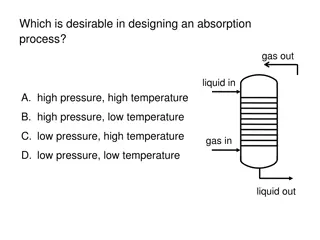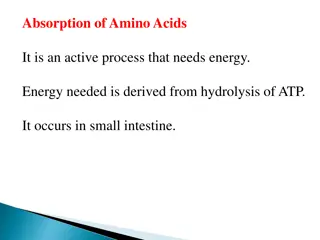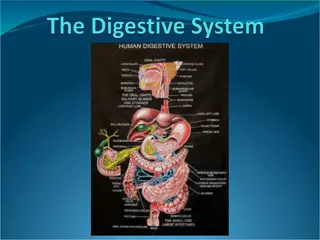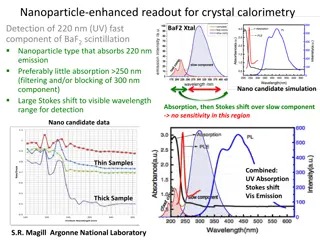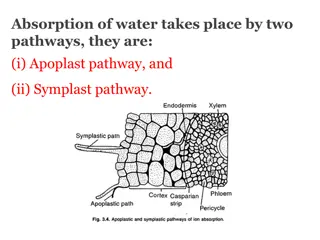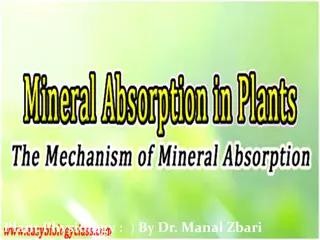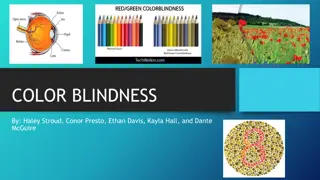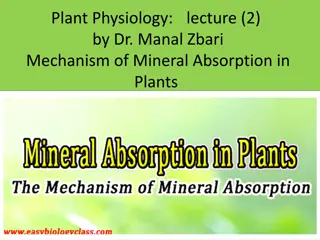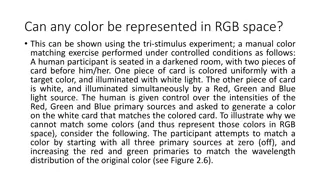ASPEN Staged Separation Unit-Ops
Introduction to Aspen Staged Separation Unit Operations for the purification of desired components by removing impurities and pollutants using distillation, absorption, and stripping columns. This technology is relevant to ammonia synthesis to prevent catalyst poisoning by removing CO2 through absor
0 views • 26 slides
Understanding Water Absorption in Plants: Mechanisms and Implications
Exploring the intricate process of water absorption in plants, this course delves into the active and passive methods used by roots to uptake water from soil, the role of osmosis in osmotic active absorption, the influence of transpiration on passive absorption, and the significance of root hairs in
1 views • 26 slides
Anatomy of Intestine in Domestic Animals
The intestine in domestic animals plays a vital role in digestion and absorption. It consists of the small intestine for chemical digestion and absorption and the large intestine for water absorption and excretion. This article covers the gross anatomy, histology, and embryology of the intestine, de
2 views • 84 slides
Understanding Digestion and Absorption in the Gastrointestinal Tract
Digestion and absorption in the gastrointestinal tract are crucial processes for breaking down carbohydrates, fats, and proteins into smaller compounds that can be absorbed by the body. Carbohydrates undergo hydrolysis to convert into monosaccharides, fats are broken down from triglycerides, and pro
1 views • 22 slides
Understanding Absorption Processes and McCabe-Thiele Analysis
Desirable conditions in designing an absorption process include low pressure and high temperature for the gas in and liquid out. Learn about appropriate plots, points on the operating line, absorption factors, minimum absorbent usage, assumptions in McCabe-Thiele analysis, and differences between co
3 views • 14 slides
Mastering Color in Film: A Comprehensive Guide to Using Color Grading Techniques
Explore the intricate world of color in filmmaking through understanding color grading, log explained, Log rec.709, color correction, and grading techniques without LUTs. Enhance your storytelling by harnessing the power of color to evoke emotions and create visual impact in your films.
1 views • 6 slides
Understanding Absorption Costing and Overhead Absorption in Cost Accounting
Absorption costing is a method that includes direct costs and a fair share of production overhead costs in the cost of a product. Overhead absorption rate (OAR) is calculated using budgeted figures and can lead to over/under-absorption. Over-absorption occurs when absorbed overhead is more than actu
1 views • 23 slides
Understanding Atomic Absorption Spectrophotometry in Analytical Chemistry
Atomic absorption spectrophotometry (AAS) is a spectro-analytical technique used for quantitative determination of chemical elements through the absorption of light by free atoms. This method is vital in various fields like biophysics, toxicology, and archaeology, allowing the analysis of over 70 di
0 views • 9 slides
Enhancing CO2 Absorption Through Prioritizing Agriculture in UNFCCC Deliberation
COP 24 aims to address the challenges of global warming but faces obstacles in reducing CO2/GHG emissions. Emphasizing agriculture as a key solution due to its CO2 absorption capabilities can lead to breakthroughs. Implementing measures like modern technology in agriculture and promoting initiatives
1 views • 12 slides
Understanding Water Absorption in Plant Root Systems
Absorption of water by plant roots is a crucial process involving osmosis and gradients. The root system structure plays a vital role in water absorption efficiency, with root hairs being key to this process. Factors such as soil penetration depth and root hair characteristics impact the extent of w
0 views • 21 slides
Understanding Biopharmaceutics: pH Partition Theory and Drug Absorption
Biopharmaceutics explores how drug properties and administration methods impact drug absorption. Factors affecting oral absorption include membrane physiology and drug partitioning based on pH levels. The pH partition theory, explained by Brodie et al., highlights the role of drug lipid solubility a
0 views • 9 slides
Understanding Drug Absorption, Excretion, and Bioavailability in Humans
Delve into the complex processes of drug absorption, excretion, and bioavailability in the human body. Learn about the various factors affecting drug absorption from the gastrointestinal tract, including biological, physiochemical, and pharmaceutical factors. Explore the mechanisms of drug transport
0 views • 24 slides
Amino Acid Absorption Mechanisms in Small Intestine
Amino acid absorption in the small intestine is an active process requiring energy derived from ATP hydrolysis. It involves two main mechanisms: carrier proteins transport system and glutathione transport system. The carrier proteins transport system uses ATP energy for absorption, while glutathione
0 views • 18 slides
Understanding Fauvism: Working with Colors and Color Schemes
Fauvism is an art movement known for its bold and arbitrary use of colors. Fauvist painters carefully selected colors to convey specific moods in their artworks. This guide explores Fauvism, color theory, and different color schemes to help you create your own expressive painting. Learn about comple
0 views • 8 slides
Understanding Color Theory: A Comprehensive Guide
Practical guidance on color theory including the color wheel, color schemes, and color psychology. Learn about the importance of utilizing various color schemes like monochromatic, complementary, and analogous to create effective designs. Understand how different colors convey meanings and emotions
0 views • 11 slides
Lean Oil Absorption Process in Gas Processing
The Lean Oil Absorption process in gas processing involves using hydrocarbon-rich lean oil to absorb heavier hydrocarbons from natural gas, allowing for increased gas condensate recovery. This method is a cost-effective way to separate different products in natural gas, alongside refrigeration proce
1 views • 14 slides
Understanding Color: Characteristics, Color Wheel, and Interior Decoration
Color is a vital aspect of our everyday lives, evoking various emotions and perceptions. This article delves into the characteristics of color, the color wheel, color schemes, and the use of color in interior decoration. It explains how colors are perceived, the qualities of color like hue, value, a
1 views • 51 slides
Fun and Educational Color Mixing Experiment for Elementary Students
Engage elementary school students in a hands-on color mixing experiment using primary colors to create secondary colors. The activity involves visual demonstrations, color paddles, and mixing colored goo in bags to understand color blending and create unique color combinations. Through this interact
0 views • 7 slides
Understanding the Human Digestive System: A Comprehensive Overview
The digestive system plays a vital role in breaking down food into nutrients for absorption. This process involves stages like ingestion, digestion, absorption, and egestion. Beginning with the mouth, food moves through the esophagus, stomach, and small intestine for digestion and absorption of nutr
0 views • 21 slides
Nanoparticle-Enhanced Readout for Crystal Calorimetry: BaF2 Scintillation Detection
Nanoparticles with specific absorption and emission properties are explored to enhance the readout process for BaF2 crystal calorimetry, focusing on detecting the fast 220nm UV component. The goal is to achieve a large Stokes shift to the visible wavelength range for efficient detection, while minim
0 views • 7 slides
Water and Mineral Absorption Pathways in Plants
Water absorption in plants occurs through two pathways - the apoplastic pathway and the symplastic pathway. Mineral salt absorption is a separate process, happening mainly in the meristematic regions of roots. Root cells selectively absorb ions through ion exchange, which is energetically favorable.
0 views • 13 slides
Mineral Absorption in Plants: Mechanisms and Types
Plants absorb minerals from the soil as ions through the roots, with the process of mineral absorption being distinct from water absorption. Mineral absorption in plants can occur through passive or active methods, each involving different mechanisms and energy requirements. Passive absorption is a
0 views • 14 slides
Comparison of CDOM Absorption Coefficients Using Different Filters and Instruments
This study conducted on July 13, 2011, analyzed the absorption coefficients of CDOM using various filters and instruments in different sample sources like open ocean, dockside, and Biscay pond dilution series. The comparison included measurements with ac-9 and ac-s filters of varying sizes, along wi
0 views • 11 slides
Understanding Refrigeration Cycles and Equipment
Explore the fundamentals of mechanical and absorption refrigeration, refrigerant heat absorption and rejection, compressor types, condensers, expansion devices, evaporators, and the operation of absorption refrigeration cycles. Learn about refrigeration capacity, refrigerants, halogen refrigerants,
0 views • 43 slides
Photoproduction of Pionic Atoms at the Gamma Factory: Research Overview
Research conducted by V. V. Flambaum, J. Jin, and D. Budker at the Gamma Factory (GF) on photoproduction of pionic atoms is detailed in this content. It explores the formation of pionic atoms with negative pions orbiting the nucleus in a hydrogen-like system, emphasizing strong interaction effects a
0 views • 11 slides
Understanding Attributes and Color Schemes in Graphics
Graphics systems utilize attributes to define how primitives are displayed, such as color and size, while color and grayscale can be stored in different ways like direct storage and indexed storage schemes. The RGB color components play a key role in determining the color shades, with various color
0 views • 51 slides
Water Absorption by Plants: Mechanisms and Adaptation Strategies
Understanding water absorption by plants is crucial for effective water management in agriculture. Plants absorb water through active and passive methods, driven by osmotic and non-osmotic processes. Root hairs play a significant role in facilitating water uptake, with mechanisms such as osmotic act
0 views • 26 slides
In Vitro Dissolution Study of Per Oral Tablet: Understanding Drug Absorption
Dissolution is a crucial process for drug absorption, where solid dosage forms must dissolve in gastrointestinal fluid before absorption. Factors affecting dissolution rate include agitation intensity, drug solubility, and surface area exposed to the dissolution medium. Dissolution testing plays a k
0 views • 12 slides
Understanding Ionospheric Absorption Laws and Regions
The principles of the ionosphere at middle and low latitudes, Lambert-Beer exponential absorption law, and characteristics of E and F regions are discussed. The absorption of solar radiation, recombination reactions in different regions, and ionization processes are highlighted, providing insights i
0 views • 15 slides
Understanding Color: A Comprehensive Overview
Color is a fascinating aspect of our visual world, explored through the prism of science and light. This chapter delves into the origins of color perception, from Isaac Newton's study of the color spectrum to the reflection and transmission of light that determines how we see colors. Gain insights i
0 views • 28 slides
Understanding Color Blindness: Causes, Symptoms, and Types
Color blindness, also known as color vision deficiency, is a genetic disorder that affects the ability to distinguish between certain colors. It is caused by the absence of color-sensitive pigment in cone cells of the retina, often passed down on the X chromosome. Symptoms vary from difficulty diffe
1 views • 16 slides
Gas Absorption and Atmospheric Soundings: Principles and Applications
Gases in the atmosphere absorb radiation through various mechanisms such as changing rotational/vibrational energy and exciting electrons. This absorption plays a crucial role in remote sensing applications. The absorption principles differ for molecules like CO2 and H2O, influencing their vibration
0 views • 9 slides
Mechanism of Mineral Absorption in Plants: Active vs Passive Methods
Plants absorb minerals from the soil in the form of inorganic ions through both passive and active methods. Active mineral absorption requires metabolic energy, whereas passive absorption occurs along the concentration gradient by simple diffusion. The roots play a vital role in mineral absorption d
0 views • 14 slides
Understanding Color Representation: RGB vs. CIE vs. HSV Models
Exploring the limitations of representing all colors in RGB space and the alternative approaches offered by the CIE color space and HSV color model. While RGB is limited by additive primaries, CIE provides a broader range of color representation, and HSV simplifies color perception by emphasizing hu
0 views • 8 slides
Understanding Color Blindness: Types, History, and Impacts
Color blindness, also known as color vision deficiency, affects individuals by limiting their ability to perceive certain colors. It was first discovered by John Dalton, who suffered from red/green color blindness himself. The two main types are red/green and blue/yellow color blindness, each with i
0 views • 19 slides
Understanding Design Principles: Contrast, Repetition, Alignment, Proximity, Color Theory
Explore the significance of design principles such as contrast, repetition, alignment, proximity, and color theory in creating visually appealing and effective designs. Learn how contrast plays a vital role in guiding the viewer's attention and enhancing visual interest through various techniques li
0 views • 30 slides
Exploring the Impact of Color in Film Studies
Delve into the fascinating world of color in films through a series of engaging activities and discussions. From black and white classics to vibrant modern movies, uncover how color choices influence storytelling, evoke emotions, and captivate audiences. Explore the history, science, and psychology
0 views • 6 slides
Near-UV Satellite Observations for Retrieving Aerosol Properties
Near-UV satellite observations offer a valuable method for retrieving aerosol properties, including aerosol optical depth, absorption, layer height, and surface albedo. These observations provide advantages like sensitivity to aerosol properties and negligible gas absorption interference. However, c
0 views • 16 slides
Understanding Color Theory: Basics and Applications
Color theory encompasses the color wheel, color harmony, and how colors are used. It provides a logical structure for organizing and creating colors. Primary, secondary, and tertiary colors play key roles in this theory, along with concepts like color harmony and context. By understanding color theo
0 views • 28 slides
Atmospheric Correction Techniques for Satellite Image Enhancement
Atmospheric correction is essential for improving the quality of Remote Sensing images captured by satellites. This process involves correcting for the effects of atmospheric gases such as scattering and absorption on the measured Top-of-Atmosphere (TOA) reflectance. Techniques like molecular correc
0 views • 8 slides




